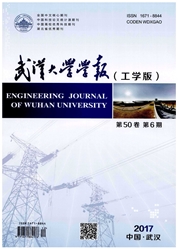

 中文摘要:
中文摘要:
我国部分城市正在进行有轨电车建设,迫切需要建立一套科学实用的选线体系,为规划设计人员提供可依据的尺度和方法.依托具体的有轨电车建设项目,从道路条件、客流条件、城市发展适应性、成本效益4方面明确了有轨电车选线准则,建立了有轨电车路线选择测度模型;该模型以影响参数为因素指标集,以路线方案为论域集,构建了有轨电车路线方案决策矩阵,应用[0,1]线性变换将其标准化;充分考虑专家知识经验以及数据本身蕴涵的信息综合确定影响参数的权重,并将标准化决策矩阵与参数权重相结合构造了加权标准化决策矩阵;基于运筹学中的格序决策方法确定了有轨电车路线方案的正负理想方案,通过计算路线方案与正负理想方案的欧氏距离以及路线方案的综合差异值来确定有轨电车最优路线方案.最后,以某市有轨电车线路规划说明了本模型的科学性与有效性.
 英文摘要:
英文摘要:
The streetcar construction has been widely developing throughout China in recent years. In order to provide reliable methods and standards for planners, a scientifically applicable route decision-making system becomes urgently necessary. In this paper, based on the specific streetcar project, the criterion of route determination is specified and developed according to conditions of roads, conditions of passenger flow, adaptability of urban development and cost-benefit analysis. And the method of route determination is proposed and developed through quantitative analysis of influencing factors in each criterion. Secondly, the influence parameters are taken as the index set of factors, and road construction projects are taken as the domain set to establish the scheduling matrix which is standardized by ~0, 1] linear transformation. Thirdly, weights of influence parameters are determined considering experts' knowledge and experience and information implicated in data. The weighted standardized decision-making matrix is built up by stand- ardized decision-making matrix and parameters' weight; and the road construction project sequence is de- termined by calculating the close degree of the projects and the ideal solutions which are determined by the lattices method in the operational research. Finally, this model is applied to the plan of streetcar route, so as to illustrate the usefulness and validity of the model.
 同期刊论文项目
同期刊论文项目
 同项目期刊论文
同项目期刊论文
 期刊信息
期刊信息
